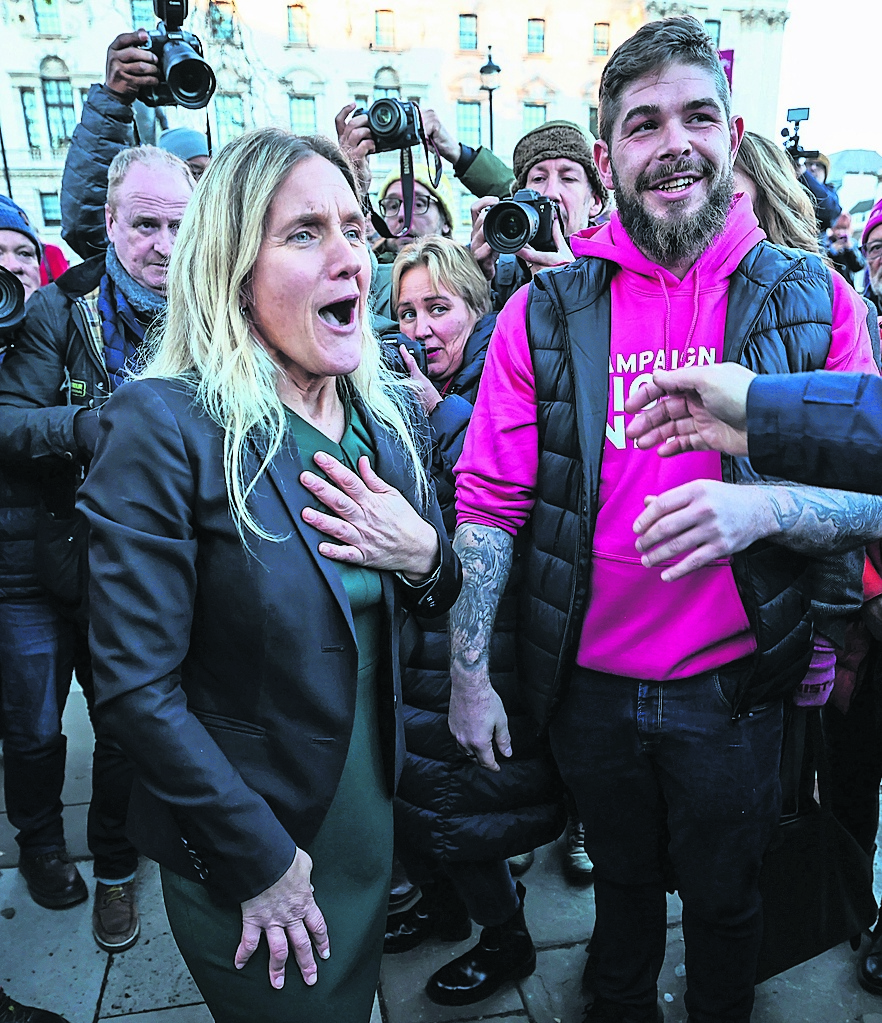
Iola Dorkins has lost the ability to speak. At the age of 76, her motor neurone disease has progressed to the point where she requires a whiteboard and pen to communicate with her husband, Mike. She is fed by a stomach tube and wears a neck brace to hold up her head so she can breathe. Mike has modified it to make it more comfortable.
Dorkins, from the village of Morfa Nefyn, north Wales, would like the right to choose when to die but for now has more pressing concerns.
“Today, she is on respite in a hospice in Holyhead,” her MP, Liz Saville Roberts, of Plaid Cymru, told the House of Commons on Friday. “It is 50 miles away from her home. That is the reality of people’s lives as things stand.”
Kim Leadbeater’s assisted dying bill, which passed its second reading last week by 330 votes to 275, aims to legalise the hastening of death for terminally ill adults who have six months or less to live.
But the issue has shone a spotlight on the need for reform of Britain’s wider, chronically underfunded palliative care system. Supporters and opponents of the bill agreed: the way the UK treats those at the end of their life desperately needs an overhaul.
During Friday’s five-hour debate, MPs of all parties mentioned the words “palliative care” 128 times. They came to the Commons armed with stories of suffering: harrowing tales of relatives’ final days; constituents’ pleas for mercy; the agony of dying friends.
“I will always be affected by watching my mum suffer at her death at the age I am now,” said Tim Farron, 54, the Liberal Democrat MP for Westmorland and Lonsdale, and the party’s former leader, two hours into the debate. “Let us not kid ourselves.
Palliative care is a postcode lottery in this country, especially for the poor and the old.”
It is a quirk — some call it a travesty — of Britain’s palliative care system that so much of it relies on charity. There are about 200 hospices in the UK, which cost £1.6 billion a year to run, according to Hospice UK. Less than £500 million of the money for hospices, such as those run by Macmillan and Marie Curie, comes from government funding. The sector has to raise the rest by fundraising, often through charity shops and by appealing to bereaved families.
Sam Rushworth, the Labour MP for Bishop Auckland, said: “We have come here to debate assisted dying, but we could have come here to build crossparty consensus on how finally, once and for all, to fix palliative care in this country.”
Anna Dixon, the Labour MP for Shipley, described the recent death of her close friend Sharon, 55, who had cancer.
Although she stressed that every “story of loss and grief is unique”, she said a deeply unequal end-of-life system meant that some people were far less likely to get good care.
“According to Hospice UK some 100,000 people die each year who could benefit from end-of-life care but do not receive it. Those who are non-white and from lower socioeconomic backgrounds are less likely to get care,” she said.
One of the most outspoken opponents of the bill in the lead-up to the debate, Rachael Maskell, the Labour MP for York, said: “Funding for palliative care has regressed against rising demand in an ageing society with growing comorbidities.
Hospices are paring back services.”
For some, the dire state of Britain’s end-of-life care is a reason to pause the drive for assisted dying. “If we get our broken palliative care system right and our wonderful hospices properly funded, we can do so much more for all the people who we will hear about today,” said Danny Kruger, the Conservative MP for East Wiltshire. “We will not be able to do that if we introduce this new option; instead, we will expose many more people to harm.”
His mother, the chef Dame Prue Leith, disagrees with him, an opposition triggered by seeing her brother, David, die “a wretched death”, which she told the campaign group Dignity in Dying “reinforced my view that dying people should have the option to die at a time, manner and place of their choosing. Some people’s suffering is beyond the reach of even the best palliative care.”
But Farron said: “In the last decade, the countries in Europe without assisted dying increased palliative care investment by over three times more than those that had legalised it. If the motivation of those who choose assisted dying is to end their pain, we can be absolutely certain that those NHS trusts with the weakest palliative care offer will be those with the highest incidence of people choosing to die. In other words, it will not really be their choice at all.”
Even Wes Streeting, the health secretary, who will be in charge of implementing the new law if it passes the next parliamentary stages, has said poor palliative care services mean some people may feel a “duty to die”.
But Dr Simon Opher, the Labour MP for Stroud and a GP with 30 years’ experience, insisted it should be possible to both bring in an assisted dying bill and improve palliative care. “The things go together,” he said. “Assisted dying is one of our tools in palliative care.”
Florence Eshalomi, the Labour MP for Vauxhall & Camberwell Green, said the issue raised wider questions about the state of the NHS. She told the story of Evan Smith, who died with sickle cell anaemia at the age of 21 at North Middlesex University Hospital. “He was in so much pain that he had to ring 999 from his hospital bed because he was denied oxygen and basic care by the doctors,” she said.
Pausing to hold back tears, Eshalomi added: “Put simply, we should be helping people to live comfortable, pain-free lives on their own terms before we think about making it easier for them to die.”
Dixon said the debate also highlighted the poor state and expense of social care.
“Some people have to spend their life savings, including the value of their home, on care,” she said. “Much of the responsibility for providing care falls to family members who fill the gap. Older and disabled people with a terminal illness may feel an unspoken pressure to go down the route of assisted dying to protect their inheritance, or because they do not want to be a burden.” A place in a nursing home costs an average £48,700 a year, rising to £63,000 in the southeast of England. In London, the cost can exceed £100,000 a year.
Some people have to spend their life savings, including their home, on care
After the debate, Toby Porter, chief executive of Hospice UK, said he was “encouraged that people on all sides have been unified on one point — MPs today have been abundantly clear: palliative and end-of-life care in the UK is currently not sufficient. People are not getting the care they need. This must change.”
David Davis, the veteran Conservative MP for Goole & Pocklington, who backed Leadbeater’s bill, urged the Labour government — which has maintained neutrality so far — to prioritise converting the bill into an effective law.
“This bill is more important than most of the bills in their manifesto — I am not trying to be rude,” he said. “More people in the Dog and Duck care about this than they do about most other things that we are doing. If we get it right, it will be one of the things that we can be proudest of in the coming years.”
